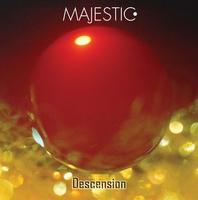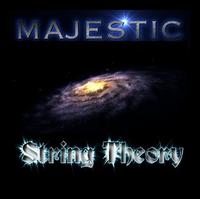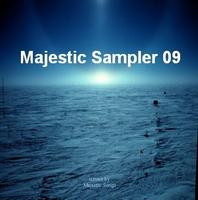Majestic
Printed From: Progarchives.com
Category: Progressive Music Lounges
Forum Name: Interviews
Forum Description: Original interviews with Prog artists (which are exclusive to Prog Archives)
URL: http://www.progarchives.com/forum/forum_posts.asp?TID=75801
Printed Date: December 23 2024 at 18:56
Software Version: Web Wiz Forums 11.01 - http://www.webwizforums.com
Topic: Majestic
Posted By: toroddfuglesteg
Subject: Majestic
Date Posted: February 09 2011 at 14:16
|
Majestic was formed as a one-man project in the US by Jeff Hamel. Hamel started playing guitar at the age of 14 and began his musical career as the guitarist for the 80's progressive metal band OSMIUM. Hamel then studied recording technology at the Record Institute of Detroit. The result so far has been four albums. I got in touch with Jeff for the Majestic story. ##########################################################
What
is your musical background ? How do you choose the members of the
various albums ? Did any of them, past and present, play in any other
bands before joining you in Majestic ?
I
started out in playing violin and continued through high school.
Eventually, I ditched the violin and picked up a guitar. When I first
started playing the guitar I was fortunate to have the opportunity to
be mentored by Joey Mazolla (from Sponge). After high school, I went
on to become a graduate of the Recording Institute of Detroit.
Throughout the late 80’s and early 90’s I played in various
prog-metal and cover bands. The mid 90s I gave up playing out and
just started focusing on writing. At the time, I really started
getting into the 70’s prog and figured I’d better start learning
some keyboards if I wanted to create that type of music. So for the
next ten years I just quietly explored the different places music
could take me a lot of which you hear today.
It
wasn’t until recently that I embraced working with other musicians.
Mainly for the fact, I enjoy writing and recording all the music
myself. A few years ago I met Gregg Johns of Slychosis and we talked
about writing some music together, which eventually became the
Proximal Distance project. This opened my eyes up on what I needed to
do for Majestic and also started introducing me to other like-minded
musicians.
  Let's
go straight to the first album. Please tell us more about Descension
from 2007. Please tell us more about your second album String Theory
from 2008 I
will answer these together since they both happened at the same time.
Around 2005, I put up a couple of tracks up to MySpace not expecting
anything to come from it. I got some good feedback, so of course, I
continued writing and this trend continued to gain more attention
with each track. In 2007, a label called Andromeda asked me to put
some tracks together for them. So I did. The result was String
Theory. Subsequently, Mike Lanin of Mals contacted me about doing a
release. Unfortunately, I had all my new tracks committed to
Andromeda but Mals welcomed the opportunity to explore my older work.
Mals released Descension and Andromeda released S.T. within a couple
months of each other.
Looking
back neither CD should have been released. The quality was rushed and
lack of decent vocals really killed any possibility of those discs
going anywhere. On the other hand, the evolution and maturing of the
sound can be heard with each project.
 Please
tell us more about your third album Arrival from 2009 Arrival
was the turning point of Majestic. I met vocalist Jessica Rasche and
even though she wasn’t familiar with prog at the time, we
collaborated on a couple of tracks. One of the test tracks “Wish”
ended up on Arrival and after listening, I knew right away that she
was the perfect voice for Majestic. Having a vocalist allowed me to
take a different approach with Arrival. I decided to attempt to write
bigger, more epic prog songs. What I ended up with was an 80 min cd
with only 4 songs. Not only was the length of the songs increased but
also the quality and detail of the music was greatly increased. Mals
heard it and wanted to release it. The response from Arrival was very
positive, which was a pleasant surprise because the first two CD’s
didn’t do anything.
 Please
tell us more about your fourth and most recent album Ataraxia from
2010 When
I sat down to write Ataraxia, I knew I had more resources to utilize
and tap into. So what I chose to do was to bring in more people and
try to get some diversity in the music while maintaining centralized
ideas or themes. The end result is different yet dynamic tracks with
one sound. Having lots of people involved on Ataraxia made it loads
of fun and ended up being a great way to exercise experimentation. It
was great to give, for example, John Wooton or Gregg Johns a track
and it comes back exactly or better than you thought it would without
telling them anything. Jessica as well stepped up and contributed
more writing and ideas this time around. What started out as a one
man show has turned into a whole family of musicians with a shared
vision. Ataraxia is the culmination of all this.
I
was apprehensive about how Ataraxia would be received. A lot of
people liked Arrival yet this was not as “heavy” or metal
sounding as its predecessor. But Ataraxia has been doing outstanding
for us and we are very pleased.
 …......
and the sampler Majestic Sampler 09 from 2009 Majestic
Sampler was a collection of tracks released while I was recording the
Proximal Distance cd. The CD contained a couple of tracks from each
Descension and S.T. plus some unreleased tracks that were completed
prior to Arrival.
How
is the availability and distribution of your albums ?
We
are available pretty much anywhere. Mals our label is out of Russia
and they cover Baltic and Ukraine part of the world. Of course all
our music is available via our website http://www.majesticsongs.com/" rel="nofollow -
. We are also in all your online outlets like I-tunes, cd-baby,
rhapsody, and etc.
What
inspires you to create new music and what is your recording technics?
What
I write really depends on my mood. Since I write music first, the
music usually dictates what the lyrics will be about. Most of my
tracks start at piano and grow from there. What we end up with is
nothing like when it is started. Most of the recording takes place
over the internet where I start some basic song structures then send
to others. After everyone has completed their parts I bring
everything together and go back through the song and fine tune
everything. Working this way has pros and cons, the bad part is that
working this way takes a long time therefore you are usually working
on multiple things at once to keep production going. The good part is
that it takes a long time and you always come back with fresh
thoughts and new ideas since you may not heard that particular piece
in weeks. Just
to give those of us who are unknown with your music a bit of a
reference point or two: How would you describe your music ? It
has lot of same styles as traditional bands like Yes, Floyd and
Genesis. But we also have a heavier side with some of the
contemporary bands such as Ayreon, Riverside, Stream of Passion and
Porcupine Tree. Symphonic neo-prog is what some have called it.
How
is your gigs situation at the moment. Do you find it difficult to get
gigs in USA and/or in any other countries these days ? What
gigs?
Most of us have other local bands that we play with. There is some
that live in other states as well. The music we do here with Majestic
has very lush orchestral arrangements, which make it difficult to
transition over to live. So unfortunately for the time being we are
not doing shows. Not to say we won’t in the future but at least
right now is not feasible.
What
is your plans for the rest of this year and beyond ? We
are planning a new Majestic EP release early this year which is just
about completed recording. Writing also has started for the next
Proximal Distance CD which is sounding very promising. We will begin
composing the next Majestic CD probably in a few months which I am
excited to get started on.
To
wrap up this interview, is there anything you want to add to this
interview ?
Only
that we want to thank you for your work at ProgArchives. It is sites
like yours that allows us to do the music we love and helps get our
name out to people who enjoy it.
Thank you to Jeff for this interview His PA profile is http://www.progarchives.com/artist.asp?id=4942" rel="nofollow - and his homepage's http://www.majesticsongs.com" rel="nofollow -
|
Replies:
Posted By: memowakeman
Date Posted: August 16 2011 at 18:51
|
Great interview. I've just discovered Majestic's music and he is a very talented man! ------------- Follow me on twitter @memowakeman |
